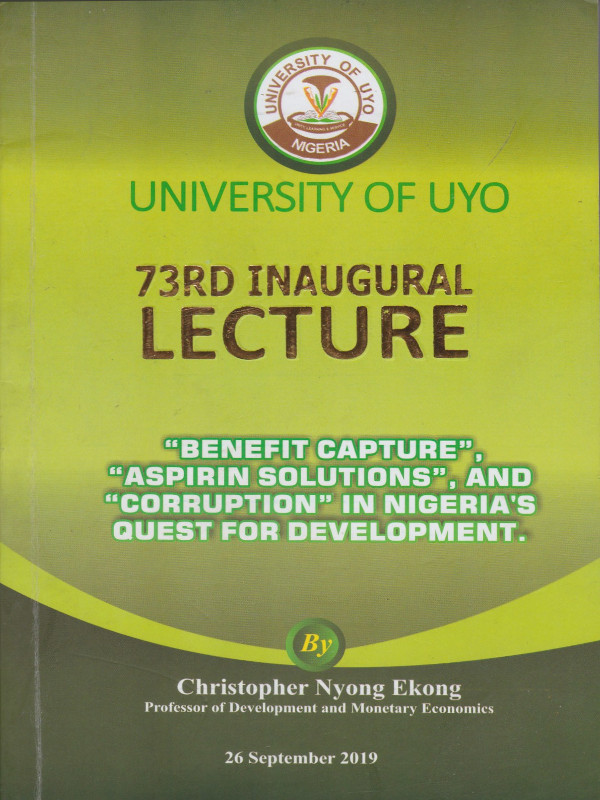“Benefit Capture”, “Aspirin Solutions”, and “Corruption” in Nigeria’s Quest for Development
$15.00
73rd Inaugural Lecture of University of Uyo
Description
Contents
Section 1:
Background
Section 2:
Theoretical Literature
2.0 Introduction
2.1 Linear stages of Growth Model
2.2 Structuralism
2.3 Dependency Theory
2.4 Basic Needs Theory
2.5 Neoclassical Theory
2.5.1 Structural Adjustment
2.6 Post Development Theory
2.7 Sustainable Development
2.8 Human Development Theory
2.9 Participatory Development Theory
2.10 Constraints to Growth and Development
2.10.1 Growth Diagnostics
2.10.2 The resource Curse Theory
2.10.3 Acemoglu’s Growth Constraint Hypothesis
Section 3: Historical Review of Nigeria’s Quest for Development
3.0 Introduction
3.1 Nigeria’s Quest for Development in the Pre and Post-Colonial Period (1880-1950)
3.2 Nigeria’s Quest for Development in the Internal Self Government Era (1951-1960)
3.3 Nigeria’s Quest for Development in the Early Post-Independence Nigeria (1960-1980)
3.4 Nigeria’s Quest for Development (1980-2018)
3.4.1 Agricultural Sector
3.4.2 The Oil Sector
3.4.3 The Industrial Sector
3.4.4 Telecommunications Sector
3.4.5 The Infonnal Sector
3.5 Historical Wrap-Up
Section 4: Natural Resource Endowment of Nigeria
4.1 Introduction
4.2 The Lists of Natural Resources of Nigeria, by States
4.3 Profile of Some Solid Mineral Deposits in Nigeria
Section 5: Stylized Facts on the Nigerian Economy
5.1 Introduction
5.2 Commodity Export: Processed and Unprocessed Commodities
5.3 Sectorial Contributions to Gross Domestic Product (GDP)
5.3.1 Agriculture
5.3.2 Industry
5.3.3 Manufacturing
5.3.4 Trade
5.3.5 Services
5.3.6 GDP Growth rate
5.3.7 Oil Revenue as a Percentage of Total Government Revenue
5.3.8 Tax Revenue as a Percentage of Total Govemment Revenue
5.3.9 Unemployment Rate
5.3.10 Inflation Rate
5.4 Global ranking of the Nigerian Economy
Section 6: How “Aspirin Solutions”, “Benefit Capture” and “Corruption” Limits the Growth and Development in Nigeria
6.1 Some Contemporary Leading Growth
6.1.1 Acemoglu’s Growth Limiting Hypotheses and Haussmann and Rodrik‘s Growth Diagnostics Argument
6.1.2 The Leadership Debate
6.2 Result of the Growth and Development Limiting Diagnostics in Nigeria
6.2.1 “Aspirin Solutions”
6.2.2 “Benefit Capture”
6.2.3 “Corruption”
6.3 Empirics of the Nexus between Corruption and Development
6.3.1 The Demand and Supply of Corruption
6.4 Strategies to Eradicate “Aspirin Solutions”, “Benefit Capture” and Corruption in Nigeria
6.4.1 “Aspirin Solutions”
6.4.2 “Benefit Capture
6.4.3 “Corruption”
6.4.3.1 Demand for Corruption Limiting Policies
6.4.3.2 Supply for Corruption Limiting process
Section 7: Some Quick Economic Relation Suggestions for Akwa lbom State Government
Section 8
Conclusion
References
Appendix 1
Corruption Perception Index Table
Appendix 2
Benefit Capture Model
Appendix 3
Aspirin Solutions Model
Appendix 4
Table 5.1 (Some Key Variables of the economy)
Appendix 5
Regression Results
Appendix 6
Table 6.1 (Diagnostic Matrix)
Appendix 7
Table 6.1 (World Bank Funded Programs in Nigeria)
Appendix 8
Table 6.2 (Diagnostic Matrix for Nigeria)
Appendix 9
Abstracts of Lecturers selected works

Prof. Christopher Ekong
Christopher Ekong is a professor of Economics at Faculty of Social Science, University of Uyo. His indepth research in Monetary Economics, Money & Banking, Environmental Economics, Economic Development and more has given birth to highly sought after Books, Book Chapters and Journal Articles. Majority are open access in his personal knowledgebase which is accessible at www.christopherekong.com.ng.
Questions and Answers
You are not logged in
